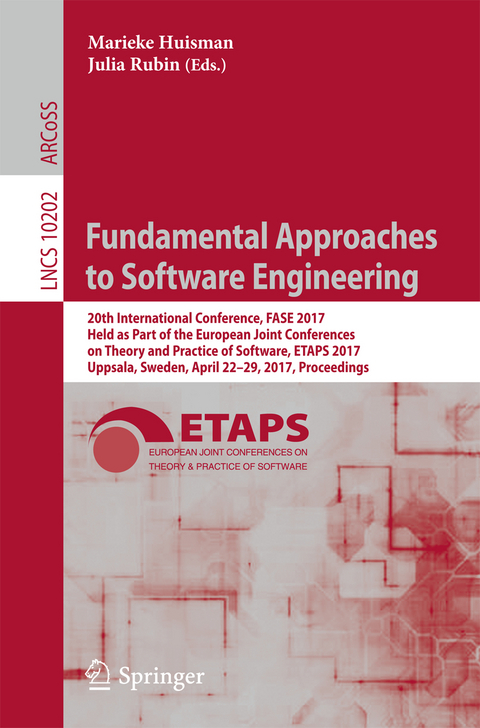Fundamental Approaches to Software Engineering
Springer Berlin (Verlag)
9783662544938 (ISBN)
The 23 papers presented in this volume were carefully reviewed and selected from 91 submissions. They were organized in topical sections named: learning and inference; test selection; program and system analysis; graph modeling and transformation; model transformations; configuration and synthesis; and software product lines.
Learning and Inference.- Should We Learn Probabilistic Models for Model Checking? A New Approach and an Empirical Study.- Bordeaux: a tool for thinking outside the box.- Test Selection.- Bucketing Failing Tests via Symbolic Analysis.- Selective Bisection Debugging. - On the Effectiveness of Bug Predictors with Procedural Systems: a Quantitative Study.- Program and System Analysis.- Inference and Evolution of TypeScript Declaration Files.- Explicit Connection Actions in Multiparty Session Types.- Change and Delay Contracts for Hybrid System Component Verification. - Precise Version Control of Trees with Line-based Version Control Systems.- Graph Modelling and Transformation.- StaticGen: Static Generation of UML Sequence Diagrams.- Inter-Model Consistency Checking using Triple Graph Grammars and Linear Optimization Techniques.- GTS Families for the Flexible Composition of Graph Transformation Systems.- Symbolic Model Generation for Graph Properties. - Model Transformations.- TraceabilityMappings as a Fundamental Instrument in Model Transformations.- Reusing Model Transformations through Typing Requirement Models.- Change-preserving model repair. -A deductive approach for fault localization in ATL model transformations. -Configuration and Synthesis.- OpenSAW: Open Security Analysis Workbench.- Visual Configuration of Mobile Privacy Policies.- Automated Workarounds from Java Program Specifications based on SAT Solving. -Slicing from Formal Sematics: Chisel.- EasyInterface: A toolkit for rapid development of GUIs for research prototype tools.- Software Product Lines.- Family-Based Model Checking with mCRL2.- Variability-specific Abstraction Refinement for Family-based Model Checking.- A Unified and Formal Programming Model for Deltas and Traits.
| Erscheinungsdatum | 08.04.2017 |
|---|---|
| Reihe/Serie | Lecture Notes in Computer Science | Theoretical Computer Science and General Issues |
| Zusatzinfo | XIII, 444 p. 130 illus. |
| Verlagsort | Berlin |
| Sprache | englisch |
| Maße | 155 x 235 mm |
| Gewicht | 700 g |
| Themenwelt | Mathematik / Informatik ► Informatik ► Software Entwicklung |
| Informatik ► Theorie / Studium ► Compilerbau | |
| Schlagworte | Applications • Compilers and interpreters • Computer architecture and logic design • computer programming languages • Computer programming / software engineering • Computer Science • computer software selection and evaluation • conference proceedings • Debugging • domain-specific languages • generative software • Graph transformation • Informatics • Logics and meanings of programs • Mathematical logic and formal languages • Mathematical theory of computation • Model Checking • model-driven development • model transformation • Programming and scripting languages: general • Programming languages, compilers, interpreters • Requirements Engineering • Research • Semantics • Software Architectures • Software engineering • software evolution • Software Quality • Specification • System design • system implementation • verification |
| ISBN-13 | 9783662544938 / 9783662544938 |
| Zustand | Neuware |
| Informationen gemäß Produktsicherheitsverordnung (GPSR) | |
| Haben Sie eine Frage zum Produkt? |
aus dem Bereich




